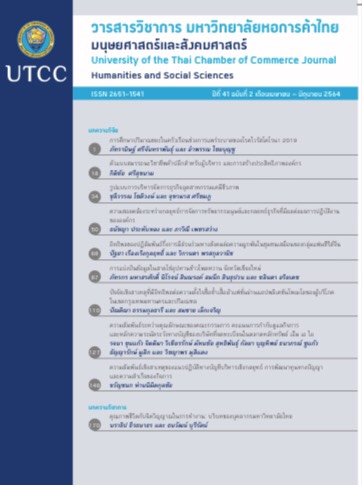The causal factors influencing repurchase intention for fashion clothes on Pomelo Application of consumers in Bangkok and its vicinity
Main Article Content
Abstract
The objective of this research was to develop and to validate the consistency of a causal relationship modal of repurchase intention for fashion clothes on Pomelo Application of consumers in Bangkok and its vicinity and to study the causal factors influencing repurchase intention for fashion clothes on Pomelo Application of consumers in Bangkok and its vicinity. The tools used in the research were online questionnaires. The sample group consisted of 350 peoples who have been repurchase fashion clothes on Pomelo Application. The statistics used in data analysis were frequency, percentage. The structural equation model is used to analyze causal relationships to find the path to the causal influence of the variables consisting of 4 components were 1) After Services 2) Satisfaction Services 3) Trust and 4) Repurchase Intention. The results of the research showed that the causal relationship model was developed in accordance with empirical data. The final was predictive coefficient of 0.87, indicating that the variables in the model can explain the variance of the repurchase intention for fashion clothes on Pomelo Application by 87 percent. It was found that the satisfaction services were the most influence on influencing Repurchase Intention for fashion clothes on Pomelo Application of consumers in Bangkok and its vicinity.
Article Details
ลิขสิทธิ์ของบทความ
ผลงานที่ได้รับการตีพิมพ์ถือเป็นลิขสิทธิ์ของมหาวิทยาลัยหอการค้าไทย ห้ามมิให้นำเนื้อหา ทัศนะ หรือข้อคิดเห็นใด ๆ ของผลงานไปทำซ้ำ ดัดแปลง หรือเผยแพร่ ไม่ว่าทั้งหมดหรือบางส่วนโดยไม่ได้รับอนุญาตเป็นลายลักษณ์อักษรจากมหาวิทยาลัยหอการค้าไทยก่อน
References
กริช แรงสูงเนิน. (2554). การวิเคราะห์ปัจจัยด้วย SPSS AMOS เพื่อการวิจัย. กรุงเทพฯ: ซีเอ็ดยูเคชั่น.
งามตา นามแสง, อรุณรุ่ง วงศ์กังวาน, บัณฑิต ผังนิรันดร์, ปราณีตรีทศกุล, สิริอร จำปาทอง, ปลื้มใจ สินอากร,
และณัฐพงษ์เตชะรัตนเสฏฐ์. (2563). ส่วนประสมทางการตลาดบริการและพฤติกรรมการตัดสินใจซื้อ
ที่มีผลต่อความตั้งใจกลับมาซื้อซ้ำของลูกค้าที่ซื้อสินค้าในซุเปอร์สโตร์ผ่านแอปพลิเคชัน. วารสาร
การวิจัยการบริหารการพัฒนา, 10(1), 11-20.
ชไมพร กาญจนกิจสกุล. (2555). ระเบียบวิธีวิจัยทางสังคมศาสตร์. ตาก: โพรเจ็คท์ไฟฟ์-โฟว์.
ธานินทร์ ศิลป์จารุ. (2555). การวิจัยและวิเคราะห์ข้อมูลทางสถิติด้วย SPSS และ AMOS (พิมพ์ครั้งที่ 13).
กรุงเทพฯ: บิสซิเนส อาร์แอนด์ดี.
นงลักษณ์วิรัชชัย. (2542). โมเดลลิสเรล: สถิติวิเคราะห์สำหรับการวิจัย (พิมพ์ครั้งที่ 3). กรุงเทพฯ: โรงพิมพ์
แห่งจุฬาลงกรณ์มหาวิทยาลัย.
เปิดพฤติกรรม ‘ช้อปปิ้งออนไลน์’ คนไทย2020กับการสร้าง new digitallLandscapeของตลาด อี-คอมเมิร์ซ.
(2563).สืบค้นเมื่อ8 มกราคม 2564, จากhttps://www.marketingoops.com/news/ecommerce/e-
commerce-outlook/
แอพช้อปปิ้งเสื้อผ้า ที่น่าโหลดติดเครื่อง 2019 ช้อปง่ายอัพเดตเทรนด์ไว [บล็อก]. (ม.ป.ป.). สืบค้นจาก
https://www.shopback.co.th/blog/gap
พิศุทธิ์ อุปถัมภ์. (2556). ความไว้วางใจและลักษณะธุรกิจผ่านสื่อสังคมออนไลน์ส่งผลต่อความตั้งใจซื้อสินค้า
ผ่านสื่อสังคมออนไลน์(การค้นคว้าอิสระปริญญามหาบัณฑิต ไม่ได้ตีพิมพ์). มหาวิทยาลัยกรุงเทพ.
Pomelo-fast fashion ที่ JD.Com คือผู้อยู่เบื้องหลัง. (2562, มิถุนายน). Marketeer. สืบค้นจาก https://
marketeeronline.co/archives/111112
Mr.Privage. (2561, 29 ตุลาคม). เพราะเหตุใด ทำไมธุรกิจจึงต้องมีMobile Application [บล็อก]. สืบค้นจาก
https://www.privageapp.com/blog/why-business-need-mobile-application
รัฐ ใจรักษ์, และประสงค์ปราณีตพลกรัง. (2555). แนวคิดในการสร้างความไว้วางใจและความมีชื่อเสียงสำหรับ
บริการในการพาณิชย์อิเล็กทรอนิกส์ (วิทยานิพนธ์ปริญญามหาบัณฑิต ไม่ได้ตีพิมพ์). มหาวิทยาลัย
ศรีปทุม, กรุงเทพฯ.
วิไลภรณ์สำเภาทอง. (2561).กลยุทธ์การสื่อสารการตลาดออนไลน์และการสร้างมูลค่าเพิ่มของธุรกิจผลิตภัณฑ์
เวชสำอาง (วิทยานิพนธ์ปริญญามหาบัณฑิต ไม่ได้ตีพิมพ์). มหาวิทยาลัยศิลปากร, กรุงเทพฯ.
ศิโสภา อุทิศสัมพันธ์กุล. (2553). ปัจจัยที่ส่งผลต่อความตั้งใจในการซื้อซ้ำในธุรกิจออนไลน์ Group Buying
(วิทยานิพนธ์ปริญญามหาบัณฑิต ไม่ได้ตีพิมพ์). มหาวิทยาลัยธรรมศาสตร์, กรุงเทพฯ.
สำนักงานพัฒนาธุรกรรมทางอิเล็กทรอนิกส์. (2563). รายงานผลการสำรวจมูลค่าพาณิชย์อิเล็กทรอนิกส์
ในประเทศไทยปี2562. สืบค้นเมื่อ 30 กันยายน 2563, จาก https://www.etda.or.th/content/
value-of-e-commerce-survey-in-thailand-2019-release.html
สุทธิดา บัวศรี. (2562). โมเดลความสัมพันธ์เชิงสาเหตุความตั้งใจในการซื้อซ้ำสินค้าผ่านแอปพลิเคชัน
ของผู้บริโภคในเขตกรุงเทพมหานครและปริมณฑล(การค้นคว้าอิสระปริญญามหาบัณฑิต ไม่ได้ตีพิมพ์).
มหาวิทยาลัยรังสิต, ปทุมธานี.
เหตุผลว่าทำไมสมาร์ทโฟนถึงมีอิทธิพลมากขึ้นในปัจจุบัน. (2561). สืบค้นเมื่อ 30 กันยายน 2563, จาก https://
yuemmai.com/2019/07/05/scoop-article-7
Adelman, B. M., & Ahuvia, A. C. (1995). Social support in the service sector: The antecedents,
processes, and outcomes of social support in an introductory service. Journal of Business
Research, 32(3), 273-282.
Bailey, J. E., & Pearson, S. W. (2016). Development of a tool for measuring and analyzing
computer user satisfaction. Management Science, 29(5), 530-545.
Bulut, Z. A. (2015). Determinants of repurchase intention in online shopping: A Turkish consumer’s
perspective. International Journal of Business and Social Science, 10(6), 56-57.
Cronin, J. J., Brady, M. K., & Hult, G. T. M. (2000). Assessing the effects of quality, value, and
customer satisfaction on consumer behavioural intentions in service environments. Journal
of Retailing, 76(2), 193-218.
Gottardi, P., Maurin, V., & Monnet, C. (2015). A theory of repurchase agreements, collateral re-use
and intermediation. Journal of Monetary Economics, 75, 54-68.
Kalia, P. (2017). Service quality scales in online retail: Methodological issues. International
Journal of Operations & Production Management, 37(5), 630-663.
Kaur, G., & Quareshi, T. K. (2015). Factors obstructing intentions to trust and purchase products
online. Asia Pacific Journal of Marketing and Logistics, 27(5), 758-783.
Kemp, S. (2020). Digital 2020 Thailand. Retrieved September 30, 2019, from https://datareportal.
com/reports/digital-2020-thailand
Kotler, P. (2003). Marketing management (11th ed.). Upper Saddle River, NJ: Prentice Hall.
Kotler, P., & Keller, K. L. (2016). Marketing management (15th ed.). Upper Saddle River, NJ:
Pearson Education.
Muhammad, K. J., & Min, W. (2020). Effects of online retailer after delivery services on repurchase
intention: An empirical analysis of customers’ past experience and future confidence with
the retailer. Journal of Retailing and Consumer Services, 54(5), 81-83.
Park, I., Cho, J., & Rao, H. R. (2012). The effect of pre and post service performance on consumer
evaluation of online retailers. Decision Support Systems, 52(2), 415-426.
Ranganathan, C., & Ganapathy, S. (2002). Key dimensions of business to consumer web sites.
Information and Management, 39(6), 457-465.
Wirtz, J., & Lovelock, C. (2018). Service quality. Upper Saddle River, NJ: Pearson Education.


